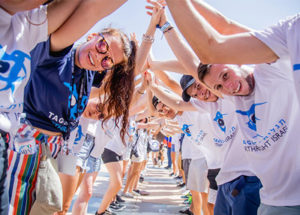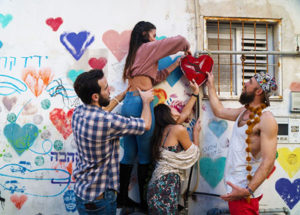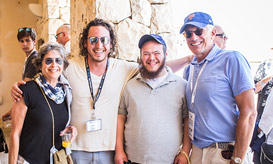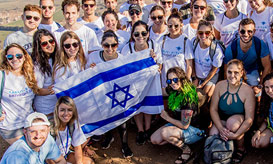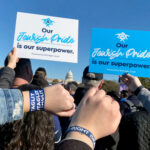On Tuesday, November 14, 2023, the Jewish community in the US had a monumental display of…
I’m listening to a guided meditation, back straight, eyes closed, when the deep, soothing voice in my headphones says, “if you’re feeling agitated, if you’ve got lots of thoughts and feelings today, that’s OK.”
This is not a reference to the war in Israel. But of course that’s the source of my agitation, of my endless thoughts and feelings.
The voice goes on to ask, “Can you accept this and keep going anyway?”
It’s a big question. The big question. A question to which, through centuries of persecution, the Jewish people have always answered, “Yes.”
It’s clearer now than ever what a marvel that is, to have persevered through history’s unspeakable horrors, to have emerged again and again, intact and strong. To have kept going anyway. How? How did the Jews do it? How will we do it now?
The weight of this question felt crushing in the early days after Hamas’ brutal rampage through Israel on Oct. 7. In the weeks since, though, the answer has become clearer.
“The ‘secret’ of our miraculous existence is our unity,” said one of the many emails from one of the many Jewish organizations that have been flooding my inbox as this crisis unfolds.
In another, I received an essay by IDF Major Ezzy Morgenstern, a father of eight now serving in his fourth war, who wrote: “Don’t allow yourself to be sucked into a vortex of gory videos or doom-and-gloom reporting. It will do you no good. Instead, share hope, faith, and encouragement.” Wars are fought with guns, Morgenstern acknowledged, but “the greatest weapons we have against hatred and evil are love and joy.”
Since the massacre and as the war continues, there has of course been enduring heartbreak and despair. Confusion. Fear. Anger. But I have felt this unity, this love and joy, radiating from Jewish spaces both virtual and physical.
In the thousands of Jews waving Israeli flags, singing Hatikvah together, in the March for Israel on the National Mall. In the way Natan Sharansky began his speech there, “Dear Family.”
In the hundreds of millions of dollars in aid Jews all over the world have raised for Israel.
At a gathering at our Jewish preschool, where the rabbi’s daughter, through tears, reminded us that we are a people of love and positivity and encouraged us to do mitzvot and acts of kindness, to fight darkness with light.
At a challah bake at our local Chabad, when, as we waited for our dough to rise, dozens of Jewish women prayed and cried together over what our people have lost, then danced in the parking lot to Israeli music in celebration of what we have.
On Halloween, trick-or-treating past Israeli flags around our block, holding out our buckets at one house for not only candy, but also handmade blue ribbon pins.
On a group chat with the mothers from my son’s class, who all rallied to post positive reviews of one mom’s bagel shop that was being harassed online for raising money for Israel.
In a local news clip covering this backlash, a man who showed up to buy a blue-and-white bagel in support summed it up this way: “we as Jews don’t tear down posters. We put them up.”
I have been awed, brought to tears, by Jewish responses to this crisis. Certainly there have been some of a different timbre – I can’t speak for or about all Jews – but responses like these are the ones worthy of focus, and even more so, emulation. They are the answer to the question of how we’ve kept going and how we’ll keep going.
The meditation guide in my earbuds advises to “stay open and brave and dignified in the face of both ease and adversity.” Again, he’s not talking about Israel or any specific people or world event. But again, I think of the Jews.
Over the course of history, it’s what we have done. It’s what we’re doing now, and what we should and will do. Stay not only open, brave, and dignified, but united, strong, hopeful, compassionate.
At the preschool gathering, the rabbi’s daughter who encouraged acts of kindness also led us in a prayer in which she hoped for the return of the hostages, and “no more injuries or deaths.” I turned to her mother, the rebbetzin, to ask whether that applied only to Jews. “No,” she said, shaking her head. “No. We mourn all loss of life.”
As Debra Messing put it in her speech during the March in Washington: “We are strong, resilient and devoted, and we will not lose ourselves. We will worry for our global Jewish family and also hurt for the innocent Palestinians used as human shields by Hamas… we will pray for the success of the IDF in a war Israel did not start and did not want, but a war Israel will win, because we must… we know especially in darkness, we stand united, proud, resolute, with absolute moral certitude in our light.”
Now more than ever, I’m proud to be a Jew and an Israel supporter, proud to be of a people that so values humanity, that responds to hatred with love and to darkness with light, that has never lost sight of ourselves or of the future.
A missive from Elias Saratovsky, head of the Birthright Israel Foundation, reflects all of this. Saratovsky stressed that “our primary concern is the safety and security of the State of Israel and humanitarian needs on the ground. Emergency relief and emotional healing are our top priorities.”
He also looked ahead: “When this war ends and it is safe to do so, it will be critically important to ensure that tens of thousands of Jewish young adults set foot on Israeli soil… giving [them] the chance to discover their heritage, and create a stronger Jewish future for all.”
I remember how it felt to spend Shabbat in Jerusalem when I visited Israel on a Birthright trip almost twenty years ago. “I can honestly say that I have never in my life been so moved or felt so connected to Judaism,” I wrote in my journal at the time. That connection has not waned.
Watching with dismay and wariness as antisemitism rises around the world, I’m more thankful than ever that Israel exists, believe more strongly than ever in the importance of supporting our homeland and our people in any way we can. Our connections to Israel and to each other are why crises like the one Jews face today hurt so much. They are also what propel us forward.
A local rabbi recently shared the tragic story of a young boy whose parents and siblings were killed by Hamas. This boy’s grandfather lived through the Holocaust to see, decades later, the slaughter of his son, daughter in law and grandchildren on Oct. 7.
“My parents were murdered when I was 14. I resisted and continued my life,” the grandfather reportedly told his newly orphaned grandson. “Today I have a grandson living in Israel! To you too, they did this to you when you were 12 years old. You too will resist, and you too will have grandchildren in Israel!”
And this – this is who we are.

